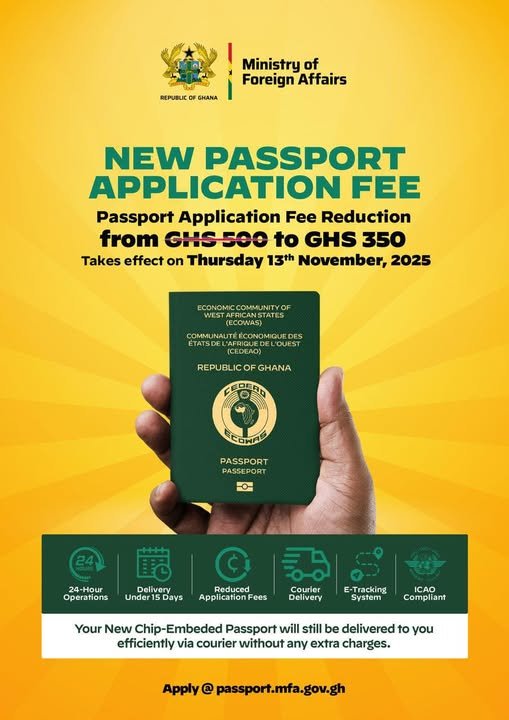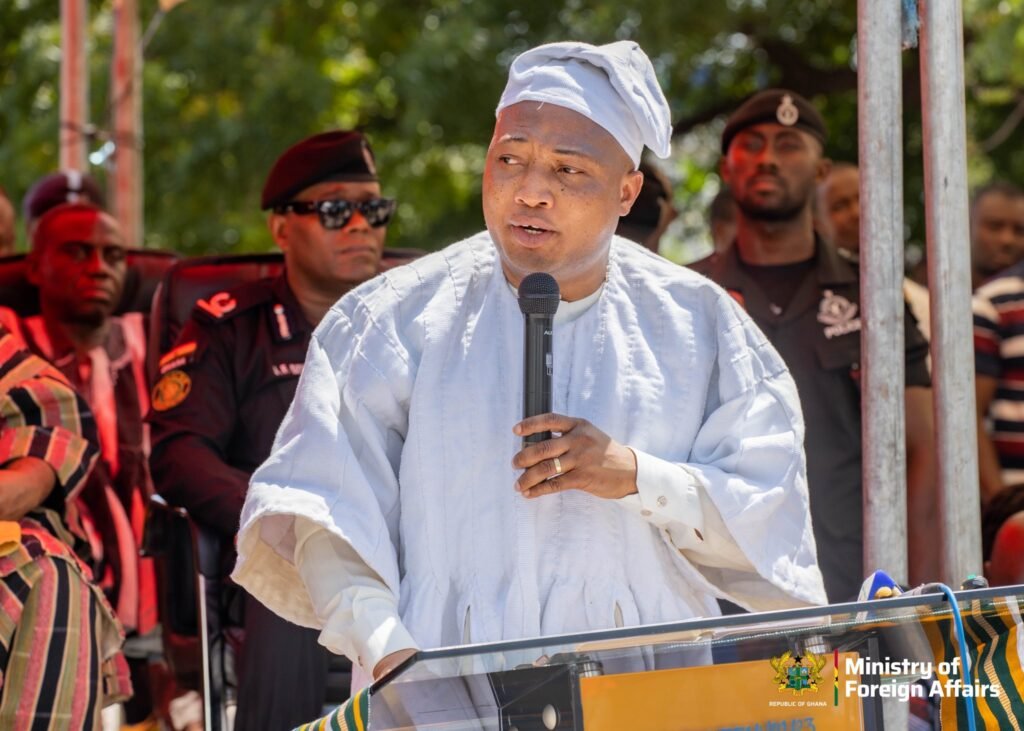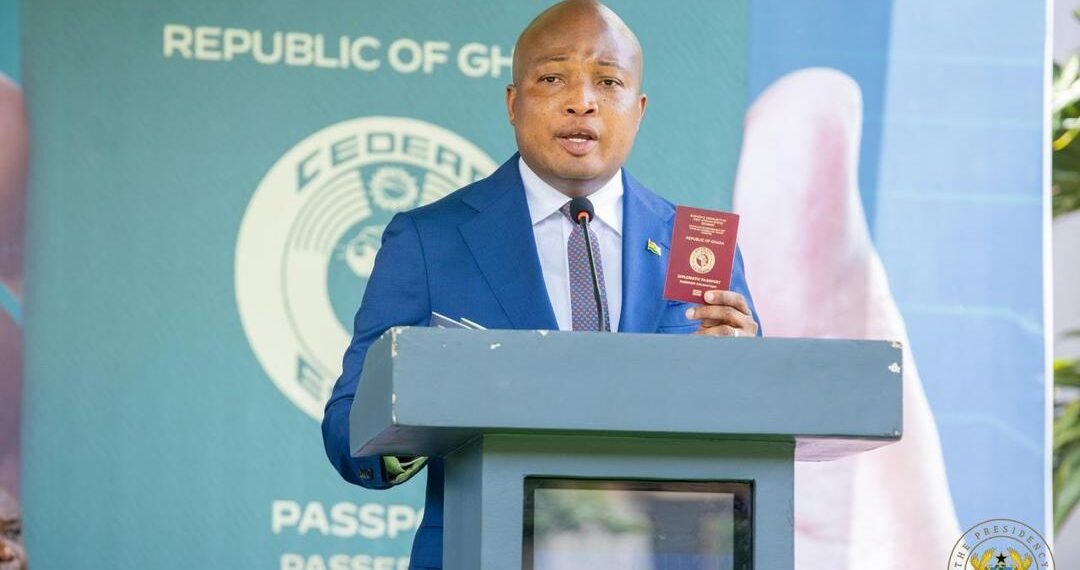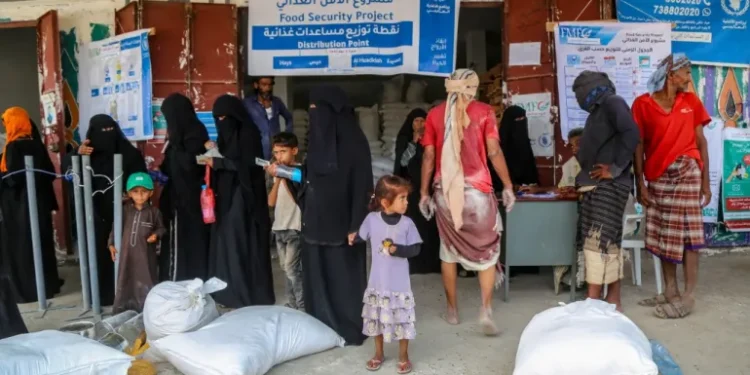Ghana’s Minister for Foreign Affairs, Hon. Samuel Okudzeto Ablakwa, has announced the implementation of a 30 percent reduction in regular passport application fees, bringing the cost down from GHS500 to GHS350.
The new fee structure officially took effect at midnight, marking another milestone in the government’s efforts to reform and modernize the country’s passport regime.
“The 30% passport application fee reduction (from GHS500 to GHS350) has come into effect since midnight. We keep our promises. For God and Country.”
Ghana’s Minister for Foreign Affairs, Hon. Samuel Okudzeto Ablakwa
The move forms part of a broader set of ongoing reforms under the Mahama administration to make passport acquisition more accessible, affordable, and efficient.
Over recent months, the Ministry of Foreign Affairs has rolled out several initiatives aimed at strengthening the passport regime and aligning Ghana’s travel documents with international standards.
The Minister’s announcement was met with widespread public commendation, as many citizens applauded the Minister for following through on his word and delivering tangible relief for applicants.

Ghanaians Welcome Reduction
Public reactions to the reduction were swift and overwhelmingly positive. Policy Analyst Alfred Appiah lauded the decision, describing it as a clear example of genuine leadership.
“This is what an actual ‘reduction’ looks like. That’s what we all learned in basic arithmetic in school. The original price has simply changed, and the system reflects it. Promise made, promise delivered. Kudos to the Honourable Minister for Foreign Affairs!”
Policy Analyst Alfred Appiah
Many Ghanaians echoed similar sentiments, commending Hon. Ablakwa for his hands-on approach and commitment to reform. Ibrahim Issaku Akosimah expressed admiration, saying, “For me, you are the best, and everyone is feeling your impactful leadership.”
Another citizen, Alidu Sulemana, added, “Your visionary leadership has brought remarkable progress to our nation. Your dedication to public service inspires citizens to work together for a brighter future.”
Others highlighted the transparency and accessibility that have characterized the Minister’s recent reforms. Armel Lom Mayele wrote, “That’s what is called transparency in communication,” while Wisdom Ahorlu Yaotse urged the Minister to “stay focused and continue to make a big legacy for the generation unborn.”

Several users shared their excitement over the ease of access to passport services under the new reforms. An applicant, Kumasi Haruna Ba, confirmed the change, noting, “Confirmed. I just did.”
Chriss Darteh reminisced about the challenges of the past, saying, “God bless you for easy access. A few years ago, it was like war trying to get a passport. We used to go to the passport office at 2:00 am and be attended to at 9:00 am. Ya bre paa o (we really suffered).”
Constructive Feedback
Some citizens also offered constructive feedback. Prince Abdulai Yakubu Suweidu raised a question about renewal procedures, asking why applicants who already have data in the system still undergo the same process as first-time applicants.
Pascal Atsu, another user, commended the reform but suggested that applicants should be allowed to use the Ghana Card in place of the birth certificate for application purposes.
The reduction in passport fees comes alongside the introduction of a one-day passport delivery service, which the Ministry says is aimed at meeting urgent travel needs while maintaining strict standards of verification and security.
These measures, according to the Ministry, represent the government’s broader effort to simplify access and reduce bureaucratic delays that have long characterized the passport application process.
The reforms have also been anchored on a major technological upgrade — the rollout of Ghana’s chip-embedded biometric passport, which was launched on April 28, 2025.
This new generation of passports, equipped with more than 175 advanced security features compared to the previous version’s 32, marks Ghana’s full compliance with international standards set by the International Civil Aviation Organization (ICAO).

With the introduction of the chip-embedded passport, Ghana joins a select group of African countries whose travel documents meet ICAO’s highest global security benchmarks.
Hon. Ablakwa has further announced plans to ensure that all regions of Ghana have access to passport application centres. He disclosed that seven regions, which currently lack passport application centres, will have them established by the end of the year, with the first of such centres launched in the Upper East Region in October 2025.

This expansion, he noted, is part of the Ministry’s commitment to decentralizing service delivery and reducing the need for applicants to travel long distances to access passport services.
Public confidence in Ghana’s passport system has grown steadily since the commencement of these reforms. The adoption of new technology, fee reduction, and expansion of service access are being viewed as strong indicators of the government’s responsiveness to citizen concerns.
The passport fee reduction, one-day delivery service, and the introduction of technologically advanced biometric passports together mark a turning point in Ghana’s public service delivery framework.
For many Ghanaians, this is a sign that government promises can indeed translate into measurable benefits for citizens. As Hon. Ablakwa succinctly put it, “We keep our promises. For God and Country.”
READ ALSO: 2026 Budget: Expert Predicts Lower Energy Revenue, Demands Accountability























